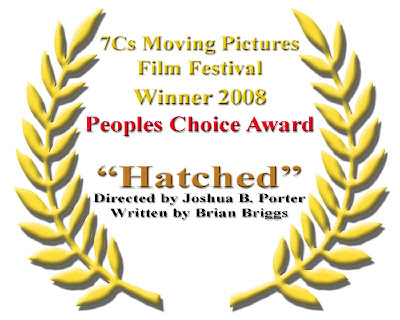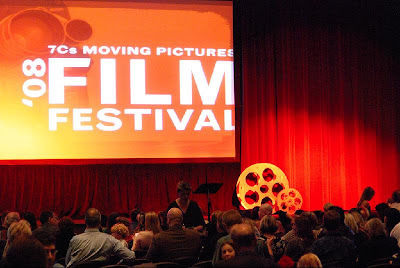Below is the complete text of the lecture I presented at The Conversation in Berkeley on October 18th.
Redefining Digital Content Distribution, or
Why Apple is About To Get Its Ass Kicked
by Ross L. PrudenI’m a filmmaker myself, and I’ve spent a long time studying movie distribution so I’m excited to share my predictions here at The Conversation. By the way, I should add that I’m a two decade Mac user so I share no joy at the prospect of Apple’s possible demise.
HOW WILL IT END?I’m currently writing a business plan for my own film company, yet when I get to the Marketing & Sales section for my plan, all I see is a US-Letter Sized question mark. Movie piracy is more pervasive than ever before—not necessarily a bad thing—and newer distribution models are still competing for dominance. How is this all going to end?
On my blog, I discuss how digital content is being distributed, and a recent post called
iTunes’ Death Knell describes how iTunes in its current incarnation faces some potentially fatal challenges from its competitors.
THE OLD MODELOur dominant model for digital content distribution of music, movies, and software has been historically rooted in physical ownership, i.e., movies are sold on DVDs, games come on CDs, and music comes on a CD or on MP3s. As broadband becomes more pervasive, we see that dominant model shift from a physical product-based ownership to a virtual license-based ownership.
Let’s say I buy a new movie at a store for $25. I buy it on DVD, take it home, and get ready to play it. Then my precocious daughter smears her cheese snack all over my new DVD. I’m out $25. Or maybe I buy a CD for $15. Or a new PC game or application for $50-$300. And then my house burns down. Once the physical product is destroyed, you
have to repurchase it. In a digital age, where copies can be made instantly and without degradation, this is unacceptable.
THE NEW MODELAnd we already see a slow exodus to the online world. More people are using online applications like Google's
Docs & Spreadsheets instead of Microsoft's Word & Excel. Netflix offers an online movie service called
Watch Instantly. Users even create their own radio stations on
Last.fm,
Pandora. The trend is slowly moving towards constantly accessible streamed content.
Right now, iTunes lets me buy a complete season of
24, but at half a gigabyte per episode, I need 12 gigabytes to store an entire season. Storing three seasons on my laptop starts to become unmanageable. Or maybe I have my entire music library on my desktop, but my laptop only carries a fraction of that. As a user, I want to have access, anywhere, to all the content I’ve
ever purchased—forever. The only way to accomplish that is to sell content licenses to stream content whenever users want it.
STEAMThe Valve Corporation, responsible for the famous
Half Life games on PC, maintains a gaming network called
Steam. Steam is a license-based platform offering over 250 games and boasting 15 million users. If you visit someone’s house, all you have to do is log into your Steam account and you can download and play
any game you own that you’ve purchased through Steam. If you need hard drive space, you can delete games from your hard drive and download them again later. If your house burns down, there's no scrambling with customer service to prove you bought your content—you only your Steam account username and password to have access to any of your games.
For the consumer, license-based distribution also makes upgrading very attractive: for example, if I bought a $20 DVD and later on I want to buy a $35 Blu-Ray DVD, I can “upgrade” my DVD license with that $15 difference and then download the newer hi-def version. Customers would never need to worry about being gouged for purchasing a newer version reissued every few years.
ITUNES, MEET DECEAlthough iTunes is popular now, it only sells
product, not
product licenses. You buy MP3s and if your hard drive crashes, those MP3s are gone. Worse, each company's proprietary DRM means MP3s purchased on other platforms like Zune cannot be played on your iPod.
DECE—which stands for Digital Entertainment Content Ecosystem—is a new license-based platform for movie content. Its financial investors are Warner Bros., Fox Entertainment, NBC Universal, Sony, Paramount, Comcast, Best Buy, Microsoft, Hewlett-Packard, Cisco, Philips, Toshiba and Verisign. Disney and Apple are not on this list.
DECE will allow:
- a TV episode to be just as easily accessed on Microsoft's Zune as it would a Philips broadband-enabled TV set;
- an unlimited number of copies of a video to be created or burned onto a disc;
- the consumer does not even need to store a copy at all, but stream it from a server-based "rights locker" that can be tapped from any location.
HOW IT WILL ENDOkay, so how will it end? What might license-based distribution actually look like in the real world? It would probably interact seamlessly with the internet and use corporate sponsorship for those unwilling to pay a monthly subscription. One such scenario could go like this:
You're over at a friend's house and you're talking about a movie you just rented online through a web site. You want your friend to watch it, too, so you sign on to that web site and the film starts to download immediately.
While you're online, another friend—in a different location—sees you're about to watch a movie and sends you a text or video message, via the web site: do you want to all watch it at the same time? You send him a virtual invite or "guest pass"—which would be limited to only 5 or 6 per movie—and now your remote friend has joined your virtual “audience”.
After the film is over, one of your friends is so impressed with the film (which he’s essentially seen for free) that he decides to buy it himself. Another of your friends recommends the movie to his friends. The remote friend might be by himself and perhaps he likes to surf the web while watching films, and so he clicks on some of the sponsored links related to the film's topic matter, e.g., clothing choices, charities the movie's actors have started, other movies the director or producers have made, other movies you're recently watched and rated, etc. Or, if the remote friend is watching your rented movie, he could pay—at any time—to watch the rental himself so as to remove all the embedded advertising links and overlays.
We’ve only spoken about music, movies, and software, but how about books? Wouldn’t it useful to remotely access the contents of any book you've ever bought? No reason why children need to lug around heavy book bags if they can instantly view or print any chapter they want to read.
TWO THINGSTwo things are clear about the current state of digital content distribution for movies:
- iTunes has the dominant model for physical product-based distribution—you buy a movie or TV show through iTunes and you can be watching it within minutes.
- iTunes no longer has the competitive edge on providing the distribution model consumers will ulimately want and if iTunes doesn’t work out an arrangement soon with the founders of DECE to sell movies through iTunes with DECE’s “rights locker” features... well, Apple is about to get their ass kicked.
Thank you very much. Please come find me on Facebook or visit my blog!
***UPDATE: Since the writing of this lecture, news has been reported of a new music streaming web site Lala.com. Lala.com lets users listen to any song without limitation, for free, in the hope that some users decide to buy the songs. Much like Steam has done for games, Lala.com allows iTunes users to upload their library and listen to their music from any location.
MORE UPDATES: Apple acquires Lala.com. Just keeps getting better, doesn't it?



















